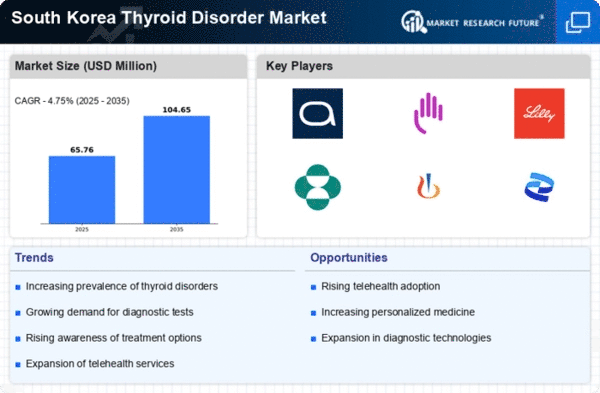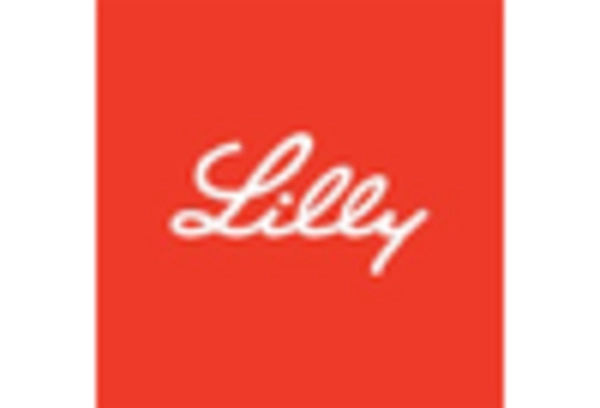Rising Geriatric Population
The increasing geriatric population in South Korea is a significant driver for the thyroid disorder market. As individuals age, the risk of developing thyroid disorders tends to rise, with studies indicating that older adults are more susceptible to conditions such as hypothyroidism. This demographic shift is expected to lead to a higher demand for thyroid-related healthcare services and treatments. The thyroid disorder market is likely to expand as healthcare systems adapt to meet the needs of this aging population, which may include more frequent screenings and tailored treatment plans. Additionally, the growing awareness of thyroid health among older adults is likely to contribute to earlier diagnosis and intervention, further propelling market growth. Stakeholders in the thyroid disorder market must consider this demographic trend when developing strategies to address the unique needs of geriatric patients.
Government Initiatives and Support
Government initiatives aimed at improving healthcare access and awareness are playing a pivotal role in shaping the thyroid disorder market. In South Korea, various health campaigns have been launched to educate the public about thyroid health, which has led to increased screening and diagnosis rates. The government has also implemented policies to subsidize treatment costs, making it more affordable for patients to access necessary medications and therapies. This support is crucial, as it encourages more individuals to seek medical attention for thyroid-related issues. As a result, the thyroid disorder market is likely to experience growth driven by enhanced patient access to care and treatment options. Additionally, collaboration between government bodies and healthcare providers may lead to the development of more comprehensive care programs, further benefiting the thyroid disorder market.
Increased Focus on Preventive Healthcare
The growing emphasis on preventive healthcare in South Korea is emerging as a key driver for the thyroid disorder market. With a shift towards proactive health management, more individuals are seeking regular check-ups and screenings for thyroid disorders. This trend is supported by public health campaigns that promote awareness of the importance of early detection and treatment. As a result, the thyroid disorder market is likely to see an increase in demand for diagnostic tests and preventive measures. Healthcare providers are responding by offering comprehensive screening programs and educational resources to help patients understand their thyroid health. This focus on prevention not only aids in early diagnosis but also contributes to better long-term health outcomes, thereby driving growth in the thyroid disorder market.
Increasing Prevalence of Thyroid Disorders
The rising incidence of thyroid disorders in South Korea is a critical driver for the thyroid disorder market. Recent studies indicate that approximately 30% of the population may experience some form of thyroid dysfunction, with conditions such as hypothyroidism and hyperthyroidism becoming increasingly common. This growing prevalence necessitates enhanced healthcare services and treatment options, thereby expanding the market. The thyroid disorder market is likely to see a surge in demand for diagnostic tests and therapeutic interventions. Healthcare providers aim to address the needs of this significant patient population. Furthermore, the increasing awareness of thyroid health among the public is expected to contribute to early diagnosis and treatment, further propelling market growth. As a result, stakeholders in the thyroid disorder market are focusing on innovative solutions to cater to this expanding demographic.
Technological Advancements in Treatment Options
Technological advancements in treatment options are significantly influencing the thyroid disorder market. Innovations in pharmaceuticals, such as the development of new medications and therapies, are providing patients with more effective and targeted treatment choices. For instance, the introduction of novel hormone replacement therapies has improved the management of hypothyroidism, leading to better patient outcomes. Furthermore, advancements in surgical techniques for thyroidectomy are enhancing the safety and efficacy of procedures. The thyroid disorder market is expected to benefit from these technological improvements, as they not only enhance treatment efficacy but also reduce recovery times for patients. As healthcare providers adopt these new technologies, the overall quality of care for thyroid disorders is likely to improve, driving market growth in South Korea.
















